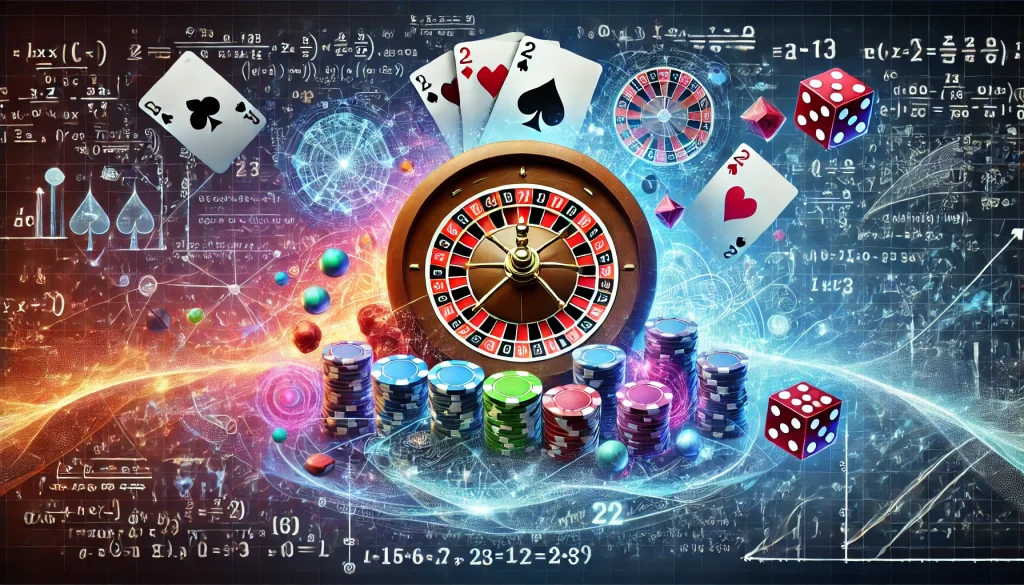
The Role of Mathematical Models in Casino Game Strategies
Casino games have long captured the imagination of players worldwide, offering an enticing mix of risk, reward, and excitement. Beyond the visible allure of flashing lights and jackpot announcements lies a mathematical foundation that governs these games. Mathematical models are integral to crafting strategies, ensuring fairness, and maintaining profitability in the gambling world. In this article, we delve into the various ways mathematics shapes casino games and strategies.
Mathematical Models and Probability in Casino Games
At the heart of every casino game is the concept of probability. This principle determines the likelihood of various outcomes, whether it’s the roll of dice, the spin of a roulette wheel, or the draw of a card. Understanding probability is essential for both players and casinos to make informed decisions. In games like roulette, for instance, each number on the wheel has an equal chance of being selected, but the inclusion of zero (or double zero in American roulette) gives the casino its edge.
Players who grasp these probabilities can develop strategies that improve their chances of winning. For example, in blackjack, knowing the likelihood of certain cards appearing can help players decide when to hit, stand, or split pairs. Casinos, on the other hand, use probability models to design games that ensure a long-term profit margin, often referred to as the house edge. These models are meticulously calculated to maintain fairness while guaranteeing profitability for the house.
The Role of Expected Value in Strategy Development
Expected value (EV) is another critical mathematical concept in gambling. It represents the average amount a player can expect to win or lose per bet over time. Games with a negative EV are designed to favour the casino, while players seek opportunities with a positive or lower negative EV to maximize their returns. Understanding EV allows players to make smarter decisions, such as choosing games with better odds or avoiding high-risk wagers with unfavourable outcomes.
For example, professional blackjack players use EV calculations to guide their decisions during gameplay. By understanding the statistical impact of every possible action, they can reduce the house edge and increase their chances of coming out ahead. Similarly, casual gamblers can use EV to identify bets that offer the most entertainment value for their money, even if profitability is not the primary goal.
Game Theory and Player Behaviour
While probability and EV focus on numerical outcomes, game theory delves into strategic interactions between players. This branch of mathematics is particularly relevant in multi-player games like poker, where decisions are influenced by the actions of opponents. Game theory models help players anticipate opponents’ moves and adapt their strategies accordingly, creating a dynamic and competitive environment.
In poker, for instance, the decision to bluff is not solely based on the strength of a hand but also on the perceived reactions of opponents. Game theory provides tools to calculate the optimal frequency of bluffs, ensuring that players remain unpredictable while maximizing their chances of success. This approach is especially valuable in high-stakes games, where psychological factors and strategic depth are amplified.
Nash Equilibrium in Poker
Nash Equilibrium, named after the renowned mathematician John Nash, is a concept in game theory where no player can improve their position by changing their strategy while others keep theirs unchanged. In poker, achieving Nash Equilibrium means adopting a strategy that cannot be exploited by opponents over the long term. This concept is particularly useful in heads-up situations, where players rely on balance to gain an edge.
Advanced poker players and professionals use simulations and algorithms to identify Nash Equilibrium strategies, incorporating them into their gameplay. While not always achievable in real-time games due to variability and human factors, striving for equilibrium ensures that players minimize losses and maximize gains against skilled opponents.

Casino Management and Risk Analysis
For casino operators, mathematical models are indispensable tools for managing risk and ensuring long-term profitability. Every game, from slot machines to table games, is meticulously designed using statistical analysis to maintain a house edge. This ensures that casinos remain profitable while offering players fair and engaging gameplay.
Risk analysis involves calculating the odds of various outcomes and balancing them against potential payouts. For example, slot machines use predetermined return-to-player (RTP) percentages to regulate how much of the wagered money is returned to players over time. This allows casinos to fine-tune their offerings, ensuring a balance between player satisfaction and revenue generation.
Random Number Generators and Fair Play
Random Number Generators (RNGs) are the backbone of online casino games, ensuring that outcomes are truly random and unpredictable. These algorithms use advanced mathematical formulas to simulate randomness, providing a fair playing field for all participants. Independent testing and certification of RNGs are essential to maintaining trust and transparency in the industry.
For example, in online slots, RNGs determine the sequence of symbols on the reels, creating a unique outcome for every spin. This randomness ensures that every player has an equal chance of hitting a jackpot, regardless of previous results. By adhering to strict regulatory standards, casinos guarantee that their games are both fair and compliant with industry expectations.
In conclusion, mathematical models are the driving force behind the structure and strategy of casino games. From guiding player decisions to ensuring fair and profitable operations, mathematics plays a pivotal role in the gambling industry. Whether through probability, game theory, or risk analysis, these models enhance the gaming experience for players and maintain the integrity of casino operations. For those who appreciate the intersection of science and entertainment, the mathematics of casino games offers endless fascination.
